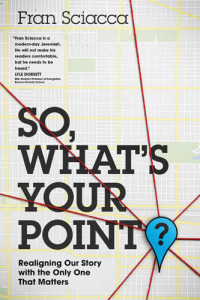By Fran Sciacca –
Is your curiosity keeping pace with your faith?
So, what’s the point?
Thirty centuries ago, a brilliant thinker and writer decided to tell God to take a long hike off a short pier. Well, not exactly, but in effect that’s how it turned out. He was determined to find a formula for meaning and purpose that didn’t include God in the equation. He was looking for an answer to the question, “So, what’s the point?” He followed his ideology down many predictable roads: hedonism, materialism, intellectualism, sensuality, and a few others. Fortunately for us, he kept a journal of sorts—a kind of ancient blog, I suppose, as it ended up going viral. The salient quality of this journal—known to Jews as Koheleth (the Preacher) and as Ecclesiastes to Christians—is the centrality of questions. In the 222 verses of this poetic journal, there are 32 questions—good questions on timeless topics such as the value of work, the nature of love, the purpose of life, the certainty of death and what to do between it and birth, wisdom and folly, and others. Wonderful, thoughtful exploration of the kinds of questions for which everyone should be seeking answers.
Though this journey was long and convoluted, his journal was short and linear, about eleven pages. The author’s adventures are varied, yet his conclusions are not. Our existential explorer discovers that every avenue he travels seeking meaning and purpose leads him back down the same alley, and a dead-end alley at that. Thirty-seven times in his journal, our exasperated seeker makes the same lament about life: “Meaningless, meaningless, all is meaningless.” Not exactly a ringing chorus for a modern praise tune, or title for the next Christian best seller! This is the wrenching cry of an empty heart, the foul fruit of a fruitless quest.
Koheleth, looking for some abiding meaning to life “under the sun,” found none. He kept a record of this quest to find a purpose (a “point,” if you will), and concluded that at the end of the day, there was none. No purpose. No meaning. No point. Instead of a glorious destination just over the rise of each new road, he found himself redundantly circling back to where he had started, alone with himself and his questions. And we’ve already seen that being wrapped up in ourselves is a small package indeed.
However, though his conclusions were empty, his questions were full. They were not only valid, they were—and continue to be—profound.
Koheleth, the Preacher, lived thirty centuries ago, nearly a thousand years before Christ. Surely we’ve made some progress in the quest for meaning since then? With over one trillion web pages catalogued by Google in 2008, for example, surely out there somewhere are the answers Koheleth sought? Unfortunately, the evidence is growing to suggest that although our modern search for meaning has the aid of search “engines,” and despite the increase in horsepower for the search, we’ve not developed any lasting answers. Higher download speeds apparently don’t correlate with reduced search times and increased “hits” when it comes to meaning, purpose, and truth.
Start by answering the most important question.
Remember when Jesus posed to Peter at Banias: “Who do you say that I am?” Without a sufficient answer to the question of Jesus’ identity, in seeking to lay hold of a purpose of your own, you will find yourself walking down Koheleth’s dead-end alley.
The identity question
In finding a purpose for your own life, we need to answer life’s second-most important question: the principle of design applied to people. In its essence, it is Jesus’ query to Peter, addressed to a mirror: “Who do I say that I am?” This is the question of identity—who I believe I am as a person. Not to be confused with self-esteem (what I think about myself), identity is at the core of what I believe about myself. It is a crucial component in constructing a sense of purpose. Even if I have an adequate answer to life’s most important question (regarding Jesus), if I lack an answer to this second question, I will find myself disillusioned with life, with Christianity, and ultimately with God Himself.
Have you looked in the mirror lately? Have you stoked your curiosity about Jesus and how you fit into His story? To unpack more on this topic, read, So, What’s Your Point?, by Fran Sciacca


